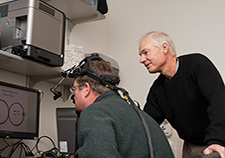Office of Research & Development |
 |
Office of Research & Development |
 |

VA Research Currents archive
November 18, 2014

Dr. William Walker (right), based at the Richmond (Va.) VA Medical Center, is with the Defense and Veterans Brain Injury Center. (Photo by Mary Beatty-Brooks)
Traumatic brain injury has become the hallmark injury of a generation of Veterans following more than 13 years of war in Iraq and Afghanistan. The most common type is mild TBI, more commonly known as concussions. These injuries account for nearly 80 percent of all TBIs. Despite the "mild" label, up to 20 percent of those with an mTBI will continue to suffer from post-concussion syndrome, a complicated mix of troublesome symptoms and impairments.
Part of the problem is the difficulty in identifying and treating mTBI. "In contrast to more severe TBI, mTBI is uniquely problematic to diagnose," says Dr. William Walker, primary investigator at the Defense and Veterans Brain Injury Center in Richmond, Va.
Walker, also a professor in the department of physical medicine and rehabilitation at Virginia Commonwealth University, led a team that developed a structured interview that clinicians can use to identify mTBI in patients. The work was published online Sept. 29, 2014, in the Journal of Neurotrauma.
The existing gold standard for diagnosing a suspected mTBI, the clinical interview, "is prone to bias, especially for parsing the physical versus psychological effects of traumatic combat events," wrote Walker and his coauthors. They say the new measure helps overcome some of that bias.
For the study, 103 Veterans who had experienced a blast within the previous two years underwent semi-structured interviews about their experience. Five highly trained TBI physicians then independently reviewed and interpreted the interview content to determine whether there was any evidence of TBI.
"The range of diagnoses was very wide," says Walker. "The data suggest that even when using experts with extensive training and experience in mTBI, clinical diagnosis alone is just not reliable enough." Walker and his colleagues used the results of the interview to develop a diagnostic algorithm from the structured interview by weighting responses.
"The algorithm considers certain symptom patterns that are more specific for mTBI than others," says Walker. "For example, if someone reports that they saw stars, this is more likely to indicate mTBI than simply feeling dazed."
The responses are weighted to identify patterns of symptoms, explains Walker, so that if patients report feeling dazed and confused, they would receive a specific score. At the end of the interview, clinicians can then tally up the responses as an indicator of whether an mTBI occurred.
"Given the range of health consequences mTBI can have on a person, it's important to get the diagnoses right," says Walker. "What's more, the bulk of these injuries occur in the field, overseas, in often dangerous places. With a structured interview, clinicians downrange can effectively diagnose an mTBI in a reliable manner without years of experience in the field."